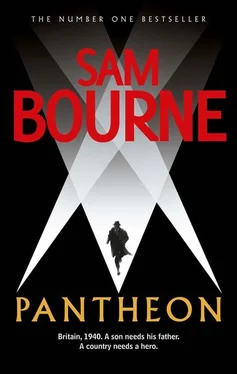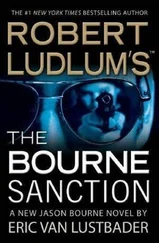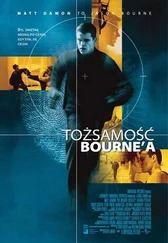Sam Bourne - Pantheon
Здесь есть возможность читать онлайн «Sam Bourne - Pantheon» — ознакомительный отрывок электронной книги совершенно бесплатно, а после прочтения отрывка купить полную версию. В некоторых случаях можно слушать аудио, скачать через торрент в формате fb2 и присутствует краткое содержание. Жанр: Триллер, на английском языке. Описание произведения, (предисловие) а так же отзывы посетителей доступны на портале библиотеки ЛибКат.
- Название:Pantheon
- Автор:
- Жанр:
- Год:неизвестен
- ISBN:нет данных
- Рейтинг книги:3 / 5. Голосов: 1
-
Избранное:Добавить в избранное
- Отзывы:
-
Ваша оценка:
- 60
- 1
- 2
- 3
- 4
- 5
Pantheon: краткое содержание, описание и аннотация
Предлагаем к чтению аннотацию, описание, краткое содержание или предисловие (зависит от того, что написал сам автор книги «Pantheon»). Если вы не нашли необходимую информацию о книге — напишите в комментариях, мы постараемся отыскать её.
Pantheon — читать онлайн ознакомительный отрывок
Ниже представлен текст книги, разбитый по страницам. Система сохранения места последней прочитанной страницы, позволяет с удобством читать онлайн бесплатно книгу «Pantheon», без необходимости каждый раз заново искать на чём Вы остановились. Поставьте закладку, и сможете в любой момент перейти на страницу, на которой закончили чтение.
Интервал:
Закладка:
He looked down at himself, fearing that he would, for the second time in his life, see a stain of red blood, spreading and expanding like a deathly inkblot. But there was no blood.
His eyes darted to Florence and Harry. Thank God, they too were safe and unmarked. He looked around the room, and saw eventually that the bullet had plunged harmlessly downward and was lodged now in the hard wood floor.
James stood up, exhausted. He reached for Harry, pulling him up so that they were looking at each other eye to eye and said the only words he could think to say. ‘Daddy’s here, son. Daddy’s here.’
Chapter Forty-four
One week later
The crew made an absurd fuss of them. Not because they knew what James had done — though that was the only reason they were allowed on the ship at all — but because they were the only civilians on board, possibly the only civilians heading this way on the entire North Atlantic. They gave Harry a seaman’s beret that was too big for his little head and insisted on calling him captain.
James had Ed Harrison to thank. Or rather Ed’s contact in the White House. Once he learned that it had been an Englishman who had thwarted a plan to leak the stolen Roosevelt-Churchill correspondence — a plan involving a group of British fascists, German intelligence, their allies in the US and a mole inside the American Embassy in London — they were ready to grant his every wish. They offered all kinds of rewards; there was even talk of a presidential medal. James said no to it all. He just wanted to get home.
So they hitched a ride on board a small cargo ship, part of a large convoy taking war material from America to Britain. It had been Florence who insisted on sailing back immediately, whatever the risks.
‘If I could do my bit for Spain, then I can certainly do my bit for my own country. Our place is back home in England, on the right side in this bloody war.’
‘It may not be the winning side, Florence,’ James had said.
‘I know,’ she said. ‘But it is right. And it’s where we belong.’ She paused. ‘We can pick up where we left off, can’t we?’
‘No, Florence. I don’t think that’s a good idea.’
‘Why?’ she asked, biting her lip in that familiar gesture of anguish.
‘I think we need to make a fresh start, you and me. No going back to old habits. Or rather, I need to make a fresh start.’
‘James, you-’
‘No, I mean it, Florence. I had become a bitter, angry old man. I wasn’t a good husband to you. I wasn’t a good father to Harry. My own son was frightened of me. Imagine that, my own son…’ His voice gave way and his wife put her hand on his shoulder. He pressed on. ‘I changed, Florence. I was no longer the man you married.’
‘You were shot, James. You saw your best friend killed. I’ve studied cases like yours. You’d suffered a great trauma.’
‘Yes, but I can’t keep blaming that. I won’t keep blaming that. Not any more. I was so busy with my bloody shoulder, I didn’t see there was a whole world out there — and my family right in front of me. I promise you, Florence, I changed once. For the worse, admittedly.’ She laughed. ‘And I can change again; for the better this time. I want to be a better man.’
‘We’ll both do things differently.’
‘We will. I can’t promise it will be perfect, but I will try. I promise.’
‘But that’s just it, James, don’t you see? I don’t want it to be perfect. I don’t want to live in a perfect world of machines and robots and straight lines, where no one feels a thing. That’s McAndrew’s world. I don’t want that. I want to live in the world of real people — with all their flaws and vices and stupid ways, with their crooked noses and funny voices and, yes, James, wonky shoulders. It’s the cracks that make us human, James, you must see that. That’s the world I want to live in. And I want to live in it with you.’
Author’s Note
Pantheon is a novel and James, Florence and Harry are fictional creations. And yet their story is rooted in the most extraordinary facts.
A ship packed with one hundred and twenty-five Oxford children and twenty-five of their mothers did indeed leave Liverpool for Yale University in the second week of July 1940. The organizers in Oxford did spend the previous weeks in hurried preparation, a process the historian AJP Taylor would later describe as ‘an unseemly scramble’. Once they had reached their temporary home, the local paper did indeed run the headline, ‘Refugees Find New Haven in Land Holding Promise of Peace’.
As for the larger mystery eventually uncovered by James Zennor, there is little direct evidence of any such plot. Those who sailed across the Atlantic on the liner Antonia, now in their seventies or older, take the same view James did: that the Yale families who opened their homes to strangers’ children, hosting them for nearly five years, did so out of altruism and kindness, nothing more. This much is lovingly recounted in two very touching books, Havens Across the Sea by Ann Spokes Symonds, herself one of the Oxford children, and See You After the Duration by Michael Henderson.
And yet, some of those who were rescued have long wondered about the motives, not of their hosts, but of the effort’s organizers: why were they singled out, was it perhaps their status as the offspring of the academic elite that made their plight particularly pressing? Tellingly, Dr John Fulton of Yale Medical School, a prime mover behind the effort, said that the Yale Faculty Committee for Receiving Oxford and Cambridge University Children hoped to save ‘at least some of the children of intellectuals before the storm breaks’. It is also the case, as James discovers in the novel, that Cambridge rejected Yale’s offer, fearing that, in the words of Sir Montague Butler, ‘this might be interpreted as privilege for a special class’.
If there is a hint of eugenics about all this, then it should not be too great a surprise. For the belief that society should encourage the strongest, fittest and brightest to have more children, while pushing, or even forcing, those deemed inferior or weak to produce fewer children or none at all, held great sway over the elites of pre-war Britain and America. In some, it fed dreams of a new breed of supermen, a pantheon of almost godlike people destined to rule over an ever-stronger human race. In others, it meant dangerous — and lethal — schemes to weed out those branded unfit for life.
The historical surprise is that the advocates of eugenics were not, as one might expect, right-wing cranks and racists. Enthusiasts included some of Britain’s greatest intellectuals, many of them on the left, all revered to this day. The quotations and arguments James comes across in the Sterling Library — from the great writer George Bernard Shaw, philosopher Bertrand Russell, the father of the welfare state William Beveridge, the lauded economist John Maynard Keynes and many others — are real and accurate. The pioneer of birth control, Marie Stopes, was so dedicated a eugenicist that she disinherited her son on the grounds that he had married a woman who wore glasses — thereby risking that his children would be short-sighted — preferring to leave much of her fortune to the Eugenics Society.
Across the Atlantic, the idea had an equally strong hold on the most privileged circles. Eugenics was particularly in vogue at Yale, as the genuine quotations cited by the fictional Dr Curtis in his evening seminar attest, including the one attributed to the former president of the university, James Angell, described by historians as ‘a fanatic eugenicist’. All the italicized passages and chapter headings from Leonard Darwin are quoted faithfully from his book What is Eugenics?
Читать дальшеИнтервал:
Закладка:
Похожие книги на «Pantheon»
Представляем Вашему вниманию похожие книги на «Pantheon» списком для выбора. Мы отобрали схожую по названию и смыслу литературу в надежде предоставить читателям больше вариантов отыскать новые, интересные, ещё непрочитанные произведения.
Обсуждение, отзывы о книге «Pantheon» и просто собственные мнения читателей. Оставьте ваши комментарии, напишите, что Вы думаете о произведении, его смысле или главных героях. Укажите что конкретно понравилось, а что нет, и почему Вы так считаете.












